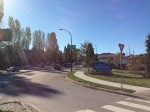As housing prices in Vancouver continue to rise, people will have to be creative about, and flexible in, their living arrangements. (photo by Cynthia Ramsay)
Until recently, Naava Smolash was living in a collective house in East Vancouver with five roommates. The combined monthly rent for the 100-year-old character house, with high ceilings, fir floors and stained glass windows, was $2,700 and, though the inhabitants have changed over the past decade, Smolash has been a constant since she moved from Montreal 10 years ago.
What’s a collective house? “It’s people sharing spaces,” she explained. “We cook together, share our food and have a house bank account to which we all contribute money. It’s a small urban commune but the difference is that the members tend to be older, with families and professionals living together.”
Smolash’s fellow roomies, all in their 30s, included a scientist, a lawyer, an artist and a law student, while Smolash herself is a professor of English literature at Douglas College. In her spare time, she manages the Vancouver Collective House Network’s Facebook page. She estimates hers was one of 50 collective houses in the city, and that the residents of at least 10 of them are being evicted. Hers included.
Things changed this past summer when her house on Victoria Drive was sold for more than $2 million. A young family will be moving in and Smolash is stuck for a place to live. “There isn’t anywhere else we can afford,” she said. “This neighborhood is changing so quickly that only wealthy people can afford to live here, and I don’t think that’s what we want.”
She’s been talking with the Waterfront Consumers’ Cooperative, which suggested she and her roommates put in proposals for buying a house. “The problem is the co-op can’t buy a million dollar house and, even if they could, the mortgage would be $5,000 a month, which would make it unaffordable,” she said.
Smolash is feeling the panic. “We’re older, we can’t just keep moving,” she lamented. “And co-op houses tend to be rented to families, while a collective home has changing inhabitants.
“What we need is more cooperatively owned collective houses. We’re hoping that people who bought houses in the 1970s or 1980s will step up and sell it to the co-op for an amount the organization can afford. In so doing, they could create a legacy of affordable collective housing that’s cooperatively owned in East Vancouver.”
Michael Geller, a Vancouver architect, planner and developer, is sympathetic to her plight. “I think there’s a need for collective housing, and there’s a real problem here. But maybe this group should look at that $5,000 per month mortgage payment as a good way to go. While we’d like to think there’s some benevolent person in the community who might be willing to donate or reduce the price of a property, it’s been very difficult to achieve that in the past.”
Susana Cogan, housing development director at Tikva Housing Society, has a budget of $75,000 this year (down from $90,000 last year) to help subsidize the rent of those in the community who need it. “Right now, we’re helping 46 Jewish people,” she said. “Being Jewish is not a condition – we house low-income people, giving preference to Jews, so if there are two families with the same need and one is Jewish, we’d subsidize the Jewish family first.”
In February 2014, Adam M (not his real name), 57, and his wife moved to Vancouver from Montreal and the two, both shomer Shabbat, struggled to find jobs and affordable rental accommodation near the Jewish centre. Eventually, they found a one-bedroom apartment near Oak and 17th for $1,200. Tikva Housing is helping subsidize 38% of the monthly rent.
“People don’t like to ask for help,” Cogan said. “But, due to circumstances, they sometimes end up having to take it. Most of the needs arise because of unforeseen things – an illness, a divorce.”
In Adam’s case, the couple had arrived in Vancouver with some resources but depleted them before they were able to find affordable accommodation.
“Our rent subsidy program is supposed to help people for the short term, while they bridge their problems,” Cogan said, adding that each case is different, but one to one-and-a-half years is the average period of assistance.
Adam is grateful for help from the Jewish community in Vancouver but said more resources from donors are necessary. “I know a lot of religious people that would want to come and live in Vancouver with their families because of the lifestyle out west. The problem is, living close to the Jewish community is too expensive.”
Cogan said we definitely should not be encouraging people to come and live in Vancouver if they cannot afford it. Subsidies are scarce, she stressed. “We can’t assist everyone who comes here and we turn a lot of people away, only assisting those who have the most need.”
Right now, there are at least 50 people waiting for Tikva Housing’s help.
“Maybe next year we’ll have even less resources,” Cogan speculated. “But our goal is that if people come here and run out of resources, we don’t want them to be living on the street. We’ll help them find affordable accommodation.”
Lauren Kramer, an award-winning writer and editor, lives in Richmond, B.C. To read her work online, visit laurenkramer.net.

